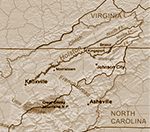 |
||||||||||
|
||||||||||
Livingston Family |
||||||||||
|
William Todd Livingston was born about 1714 in King and Queen, Virginia. He was the son of John Livingston and Margaret Todd and was born in Stratton Major Parish, King and Queen County, Virginia. He married Sarah Ware, the daughter of Peter Ware and Judith Scott. Their children probably included: On October 8, 1752 William bought 800 acres on Negro Creek in Louisa County, Virginia and moved there with his family. Then he sold 400 of the 800 acres to his son George. On November 28, 1753, William sold nine enslaved people to William Taliferro and John Shackelford of King and Queen County. On June 17, 1754, William sold Archibald Ritchie two enslaved men, Tim and Dickey. In 1755, William and George Livingston served the church as processioners on "all the lands from Rogers Branch to Negro Run between the North Anna River and Gibsons Mill Run." (Fredericksville Parish Vestry Book, 1742-1787; trans. and edited by Rosalie Edith Davis, 1978) On April 29, 1757, William sold his home place in Louisa County of 400 acres, plus 800 acres of patented land, to Peter Copeland for 80£. Soon after selling his Louisa property, William and his family returned to King and Queen County, Virginia. In 1765, William bought several hundred acres of land on the Yadkin River in Rowan County, North Carolina for 160£. On April 17 1767, William's mill on Milbrey Creek in Rowan County, North Carolina was regarded as a public Grist Mill. In 1770, William sold his Rowan County property for 160£. The family moved to Washington County, Virginia on the north fork of the Holston River. William and John Livingston signed the 1777 Petition of Holston Men. Son John served as a private in the American Revolution under Colonel Cleveland at the Battle of Kings Mountain and in at the Battle of Eutaw Springs. Williams will was proved on November 6, 1782 in Washington County.
It took nearly ten years for the final resolution of and settlement of William's estate. His will was first filed in Fincastle County and later refiled in Washington County. On April 21, 1778, the process was started in Washington County.
|
|
||||||||
|
||||||||||
|
||||||||||
|
©Roberta Tuller 2025
|
||||||||||

